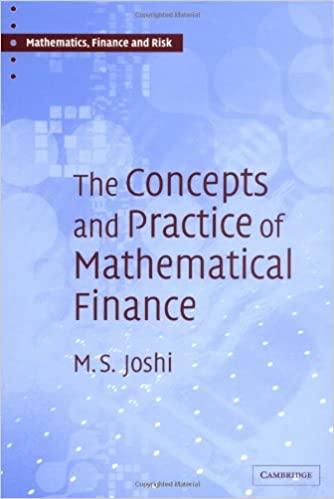Answered step by step
Verified Expert Solution
Question
1 Approved Answer
Consider a problem of choosing the level of capital stock by two firms: A and B. For simplicity we will assume that production requires capital

Consider a problem of choosing the level of capital stock by two firms: A and B. For simplicity we will assume that production requires capital only. We will follow the convention established at the lecture that in time period t the level of capital Kt is predetermined, but the firm can choose its future level of capital, K1 Firm A does not own its capital stock, but instead rents it at price r, the rental cost of capital. The problem of maximizing the value of firm A is given by: 1 F (K) K max Kt+1} t0 (1+r) Firm B owns its capital stock, and can adjust its level via investment. The problem of maximizing the value of firm B is given by: (1+r) F (K) I max Kt+1 t-0 subject to Ki+1 = (1 - 6) Kt + It (a) Derive the first order condition of firm A (b) Derive the first order condition of firm B (c) What condition has to be satisfied for both firms to choose the same level of K+1? (d) Imagine you are the owner of firm C, which rents capital goods to firm A. What would be the maximal level of r that you could charge this firm? (e) What would happen if you demanded higher rental rate than one found in (d)? Consider a problem of choosing the level of capital stock by two firms: A and B. For simplicity we will assume that production requires capital only. We will follow the convention established at the lecture that in time period t the level of capital Kt is predetermined, but the firm can choose its future level of capital, K1 Firm A does not own its capital stock, but instead rents it at price r, the rental cost of capital. The problem of maximizing the value of firm A is given by: 1 F (K) K max Kt+1} t0 (1+r) Firm B owns its capital stock, and can adjust its level via investment. The problem of maximizing the value of firm B is given by: (1+r) F (K) I max Kt+1 t-0 subject to Ki+1 = (1 - 6) Kt + It (a) Derive the first order condition of firm A (b) Derive the first order condition of firm B (c) What condition has to be satisfied for both firms to choose the same level of K+1? (d) Imagine you are the owner of firm C, which rents capital goods to firm A. What would be the maximal level of r that you could charge this firm? (e) What would happen if you demanded higher rental rate than one found in (d)
Step by Step Solution
There are 3 Steps involved in it
Step: 1

Get Instant Access to Expert-Tailored Solutions
See step-by-step solutions with expert insights and AI powered tools for academic success
Step: 2

Step: 3

Ace Your Homework with AI
Get the answers you need in no time with our AI-driven, step-by-step assistance
Get Started


